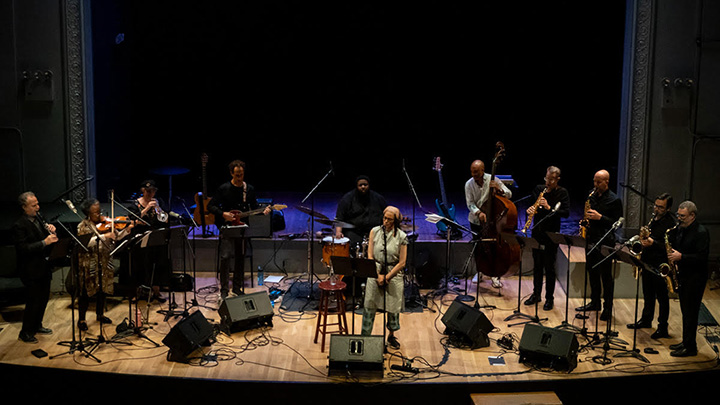Sax and town – parterre field

PRISM Quartet is a brand new music saxophone ensemble recognized for his or her dazzling brass line and mind-altering experimental new works. Begun in 1984, they’re now of their fourth decade. On June 9th they carried out Generate Music, a one-night-only present at Roulette, with a number of prestigious collaborators, together with Pulitzer profitable percussionist and composer Tyshawn Sorey and klezmer clarinet legend David Krakauer.
Generate Music is a reference to the Nazi’s “Degenerate Artwork” and “Degenerate Music” exhibitions of works by trendy, Black and Jewish artists and musicians in 1937 and 1938. The reveals have been placed on show for the German public as examples of works the fascists deemed diseased, decadent, and subhuman. Generate Music, against this, is a celebration of the work of Black and Jewish artists. It brings collectively 9 new works by Jewish and Black composers conceived to rejoice these two peoples and present how their experiences are intertwined.
The aptly named PRISM Quartet delivers a sound that, at its finest, can erect new geometry within the mind. Their brass line is like no different sound I’ve ever heard. It could mimic the human voice, making a sound like medieval plainsong the place the singing monks have been raptured, mid-note, and become beings of pure vitality. PRISM’s music is gorgeous and never fairly human, in the very best method. What a pleasure it’s to listen to this celestial sound introduced all the way down to earth and floor firmly into our political actuality. Generate Music consists of 9 excellent avant garde works, and whereas the impression I acquired on the present was primarily apolitical, most of those items, as artistically conceived, had political tales to inform.
Myra Melford and Erica Hunt’s “When No Manner Stops Wanting the One way or the other” focuses on the phrase “Zion,” one of many historic names for the land of Israel. They write in this system notes, “Like many Utopias, Zion is fragile and prone to spectacular blindness. As an illustration, one folks’s Utopia will be one other’s dispossession. Maybe, Zion shouldn’t be even a spot, however a determine for a shared planet of beneficiant futures…” The notion of a homeland, of Zion, because the place we construct with all our neighbors the place we are actually, fairly than a spot we seize and maintain by violence and degradation, is a radical one, and is very radical now on condition that it pushes towards the western mainstream media’s lockstep messaging on behalf of Israel.
Israeli composer Yotam Haber’s piece “commotio cordis” is called for the Latin for “agitation of the guts,” a medical situation the place the affected person suffers a catastrophic coronary heart assault after getting struck instantly within the chest. Haber mentioned, “I wrote this piece because the battle in Israel and Gaza unfolded after the October 7th assaults. This work is my try at a response to the inexpressible ache and struggling for all of the harmless folks concerned.” Provided that we dwell in a time when even bearing ethical witness to the genocide of Palestinians can get you fired out of your job, I consider that each one these statements come from a spot of braveness.
All through Generate Music poet Ursula Rucker learn shifting verse about her murdered brother; violinist Diane Monroe introduced a bit about segregation and the friendships between Black and Jewish Individuals; and vocalist and trumpeter Susan Watts reimagined and recontextualized the Black Nationwide Anthem in Yiddish. Tying all this music collectively was the extraordinary percussionist Tyshawn Sorey. Making up the apex of this specific prism, he fed all of the musicians a flexible percussive throughline that constructed stylistic coherence into 9 disparate works. His personal untitled work was top-of-the-line within the present.
The one piece within the present that was capable of clearly foreground the theme within the music itself was Krakauer’s “The Unknown Frequent Ancestor.” Krakauer wrote in this system that the piece is concerning the frequent musical ancestors of Black and Jewish Individuals: how their music all originates within the sound of non secular supplication. The piece succeeds in producing this sound of exuberant prayer, whether or not from the singing of a cantor in a synagogue or the ecstatic voices of choir and congregants in a Black church. Clarinet, violin, and trumpet referred to as out to the saxophone quartet throughout the stage, a leaping, spirited pandemonium, reworking klezmer, jazz, gospel, and rhythm and blues right into a shimmering tapestry of sound. Sorey’s percussion wove collectively these vibrant filaments, giving oceanic fullness to Krakauer’s wild and eccentric work.
“The Unknown Frequent Ancestor,” like many items in Generate Music, given the sheer quantity of brass, might be bodily skilled with the whole physique, the notes reverberating beneath the pores and skin after the final notice had sounded. My general impression of the chaotic, maximalist Generate Music had little to do with the themes and conceptualizations of the person works. With few exceptions, it was principally an summary sound with solely toe holds in tradition and politics.
However I wasn’t complaining. I received to listen to a number of the best musicians within the nation get collectively to jam and noodle with concepts and sounds. The efficiency general introduced me again to the nineties, particularly to nineties-era multicultural utopianism. It’s prefigurative, it’s the music we are going to make after the revolution, when there will likely be no partitions and no borders, and we are able to take Zion with us wherever we go.
Picture: Peter Gannushkin

